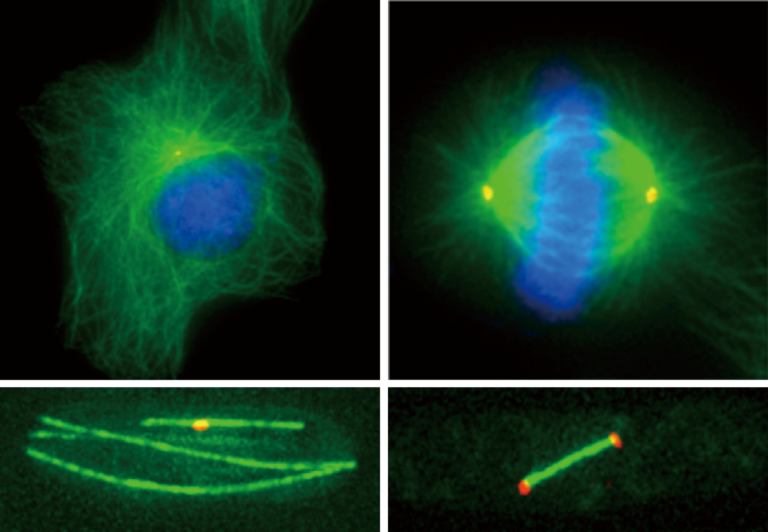Molecular mechanisms of mitotic progression
High-fidelity chromosome transmission lies at the heart of successive and successful cell division. One and only one mission of mitosis is, therefore, to ensure equal partition of sister chromatids to two daughter cells (or one mother and one daughter cell). Any errors in this process would lead to production of aneuploid progenies, a hallmark of many human cancers. Our laboratory has been working on the molecular mechanisms of how mitotic progression is organised and coordinated, particularly focusing on how bipolar spindle microtubules are assembled. We have been using the fission yeast as a model for a long time and recently started to study zebrafish and human cells to examine evolutionary conservations of the findings and their implications that we have obtained from yeast systems.

SELECTED PUBLICATIONS
Yukawa, M, Yamada, Y, Yamauchi, T and Toda, T
Two spatially distinct Kinesin-14 Pkl1 and Klp2 generate collaborative inward forces against Kinesin-5 Cut7 in S. pombe
J. Cell Sci. 2018; 131 (1): 1-11
Abstract
Yukawa, M, Kawakami, T, Okazaki, M, Kume, K, Tang, NH and Toda, T
A microtubule polymerase cooperates with the kinesin-6 motor and a microtubule cross-linker to promote bipolar spindle assembly in the absence of kinesin-5 and kinesin-14 in fission yeast.
Mol. Biol. Cell 2017; 28 (25): 3647-3659
Abstract
Hori, A and Toda, T
Regulation of centriolar satellite integrity and its physiology.
Cell Mol. Life Sci. 2017; 74 (2): 213-229
Abstract
Matsuo, Y, Maurer, SP, Yukawa, M, Zakian, S, Singleton, MR, Surrey, T and Toda, T
An unconventional interaction between Dis1/TOG and Mal3/EB1 in fission yeast promotes the fidelity of chromosome segregation.
J. Cell Sci. 2016; 129 (24): 4592-4606
Abstract
Masuda, H and Toda, T
Synergistic role of fission yeast Alp16GCP6 and Mzt1MOZART1 in γ-tubulin complex recruitment to mitotic spindle pole bodies and spindle assembly.
Mol. Biol. Cell 2016; 27 (11): 1753-1763
Abstract
Hori, A, Barnouin, K, Snijders, AP and Toda, T
A non-canonical function of Plk4 in centriolar satellite integrity and ciliogenesis through PCM1 phosphorylation.
EMBO Rep. 2016; 17 (3): 326-337
Abstract
Hori A, Peddie CJ, Collinson LM, Toda T.
Centriolar satellite- and hMsd1/SSX2IP-dependent microtubule anchoring is critical for centriole assembly.
Mol. Biol. Cell 2015;26(11):2005-2019
PubMed abstract
Koyano T, Konishi M, Martin SG, Ohya Y, Hirata D, Toda T, Kume K.
Casein kinase 1γ ensures monopolar growth polarity under incomplete DNA replication downstream of Cds1 and calcineurin in fission yeast.
Mol. Cell. Biol. 2015;35(9):1533-1542
PubMed abstract
Tang NH, Toda T.
Alp7/TACC recruits kinesin-8-PP1 to the Ndc80 kinetochore protein for timely mitotic progression and chromosome movement.
J. Cell Sci. 2015a;128(2):354-363
PubMed abstract
Tang NH, Toda T.
MAPping the Ndc80 loop in cancer: A possible link between Ndc80/Hec1 overproduction and cancer formation.
Bioessays 2015b;37(3):248-256
PubMed abstract
Yukawa M, Ikebe C, Toda T.
The Msd1-Wdr8-Pkl1 complex anchors microtubule minus ends to fission yeast spindle pole bodies.
J. Cell Biol. 2015;209(4):549-562
PubMed abstract
Hori A, Ikebe C, Tada M, Toda T.
Msd1/SSX2IP-dependent microtubule anchorage ensures spindle orientation and primary cilia formation.
EMBO Rep. 2014;15(2):175-184
PubMed abstract
Kakui Y, Sato M, Okada N, Toda T, Yamamoto M.
Microtubules and Alp7-Alp14 (TACC-TOG) reposition chromosomes before meiotic segregation.
Nat Cell Biol. 2013;15(7):786-796
PubMed abstract
Tang, N.H., Takada, H., Hsu, K.S., and Toda, T.
The internal loop of fission yeast Ndc80 binds Alp7/TACC-Alp14/TOG and ensures proper chromosome attachment.
Mol Biol Cell. 2013;24(8):1122-1133
PubMed abstract
Hsu KS, Toda T.
Ndc80 Internal Loop Interacts with Dis1/TOG to Ensure Proper Kinetochore-Spindle Attachment in Fission Yeast.
Curr Biol. 2011;21(3):214-220
PubMed abstract
Kume K, Koyano T, Kanai M, Toda T, Hirata D.
Calcineurin ensures a link between the DNA replication checkpoint and microtubule-dependent polarized growth.
Nat Cell Biol. 2011;13(3):234-242
PubMed abstract
Fong CS, Sato M, Toda T.
Fission yeast Pcp1 links polo kinase-mediated mitotic entry to γ-tubulin-dependent spindle formation.
EMBO J. 2010;29(1):120-130
PubMed abstract
Takayama Y, Mamnun YM, Trickey M, Dhut S, Masuda F, Yamano H, Toda T, Saitoh S.
Hsk1- and SCF(Pof3)-dependent proteolysis of S. pombe Ams2 ensures histone homeostasis and centromere function.
Dev Cell. 2010;18(3):385-396
PubMed abstract
Sato M, Toda T.
Alp7/TACC is a crucial target in Ran-GTPase-dependent spindle formation in fission yeast.
Nature. 2007;447(7142):334-337
PubMed abstract
Toya M, Sato M, Haselmann U, Asakawa K, Brunner D, Antony C, Toda T.
γ-Tubulin complex-mediated anchoring of spindle microtubules to spindle-pole bodies requires Msd1 in fission yeast.
Nat. Cell Biol. 2007;9(6):646-653
PubMed abstract
Sato M, Vardy L, Angel Garcia M, Koonrugsa N, Toda T.
Interdependency of fission yeast Alp14/TOG and coiled coil protein Alp7 in microtubule localization and bipolar spindle formation.
Mol. Biol. Cell. 2004;15(4):1609-1622
PubMed abstract
Garcia MA, Koonrugsa N, Toda T.
Spindle-kinetochore attachment requires the combined action of Kin I-like Klp5/6 and Alp14/Dis1-MAPs in fission yeast.
EMBO J. 2002;21(22):6015-6024
PubMed abstract
Kitamura K, Katayama S, Dhut S, Sato M, Watanabe Y, Yamamoto M, Toda T.
Phosphorylation of Mei2 and Ste11 by Pat1 kinase inhibits sexual differentiation via ubiquitin proteolysis and 14-3-3 protein in fission yeast.
Dev. Cell. 2001;1(3):389-399
PubMed abstract
Vardy L, Toda T.
The fission yeast gamma-tubulin complex is required in G(1) phase and is a component of the spindle assembly checkpoint.
EMBO J. 2000;19(22):6098-6111
PubMed abstract
Yamano H, Kitamura K, Kominami K, Lehmann A, Katayama S, Hunt T, Toda T.
The spike of S-phase cyclin Cig2 expression at the G1-S border in fission yeast requires both APC and SCF ubiquitin ligases.
Mol. Cell. 2000;6(6):1377-1387
PubMed abstract
Kominami K, Toda T.
Fission yeast WD repeat protein Pop1 regulates genome ploidy through ubiquitin-proteasome-mediated degradation of the CDK inhibitor Rum1 and the S-phase initiator Cdc18.
Genes Dev. 1997;11(12):1548-1560
PubMed abstract
